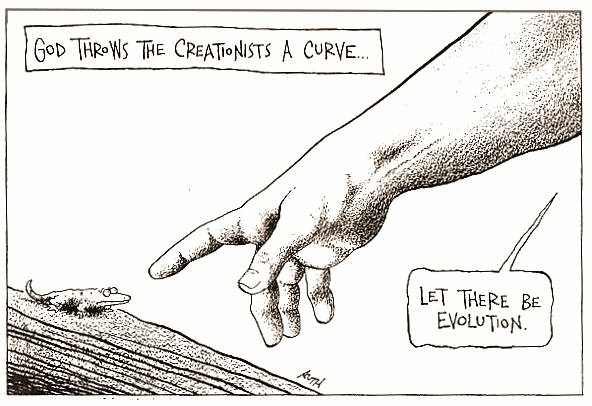 One of the most commonly acknowledged conflicts between men of faith and men of science is the fact of evolution. For many people with faith, scientific evidence for evolution is in direct conflict with the word of God, the Bible. Science, in their opinion, challenges biblical authority. Science, to them, is threat to their faith. This has led a lot of believers to be skeptical of science, as a whole.
One of the most commonly acknowledged conflicts between men of faith and men of science is the fact of evolution. For many people with faith, scientific evidence for evolution is in direct conflict with the word of God, the Bible. Science, in their opinion, challenges biblical authority. Science, to them, is threat to their faith. This has led a lot of believers to be skeptical of science, as a whole.
Skepticism, of course, is a healthy attitude, in general. However, it would be a little absurd to be skeptical of science, since skepticism is essential to science. If an individual is being skeptical of science, he is occupies an absurd space, mostly because he’s basically being skeptical of skepticism. Skeptics yield to science, because the scientific process is an extremely thorough form of skepticism.
In any case, people of faith often dismiss the theory of evolution as being “just a theory,” meaning they dismiss it as something similar to a “guess.” But there is a difference between how the word “theory” is used by scientist and how “theory” is used in common language. The question scientists ask when they devising a theory is not, “Did evolution happen?” but rather “How did evolution happen?”
What that means is that there is evidence for evolution. Evolution is a fact. The only thing that scientists are doing is guessing how evolution happens. To provide more clarity on the situation, I should point out that there is also a theory of gravitation. However, developing a theory as to why gravitation happens does not discount the reality that gravity is a fact.
Here’s the good news: you don’t have to deny facts, such as evolution, to keep to your faith.
In the article, “God vs. Science,” Dean Nelson tells the story of John Polkinghorne.
Polkinghorne is a famous physicist from Cambridge University, who achieved renown for his work in explaining the existence the world’s smallest known particles – quarks and gluons. He has been awarded membership in Britain’s Royal Society, one of the highest honors a scientist can receive. But one day, Polkinghorne invited some colleagues into his office for a meeting to tell them, “I am leaving the university to enter the Anglican priesthood. I will be enrolling in seminary next year.”
Polkinghorne admits that a religious scientist is confusing for some people. For many people, including some of his colleagues, confessing that you are a religious scientist is similar to telling someone that you’re a vegetarian butcher.
However, Polkinghorne argues, that science and religion are not mutually exclusive. In fact, to him, both are necessary to our understanding of the world.
In the article he was quoted to have said:
“Science asks how things happen. But there are questions of meaning and value and purpose which science does not address. Religion asks why. And it is my belief that we can and should ask both questions about the same event.”
That doesn’t mean to say, however, that Polkinghorne completely embraces religious mythology.
In the article, “No Need for Christians to Fear Science,” Dean Nelson discusses Polkinghorne’s initial encounter with the religious community.
As a student in Cambridge, Polkinghorne had a brief encounter with conservative evangelical Christianity. He joined the Christian Union, because he was a believer, and enjoyed fellowship within a community of believers. However, it was not an entirely positive experience, because it felt narrow minded, guilt-inducing, and fearful of other points of view.
According to Dean:
“There was a certain bleakness that seemed to be expected of the faithful, which cast something of a shadow,” he told me. “They thought that their certainty was reality, but they were mistaken.”
Polkinghorne, unlike many conservative Christians, fully embraces evolution. In fact, from his perspective, a literal interpretation of the Genesis account of creation doesn’t do justice to the beauty of the process. Porkinghorne says, “The world is ever-evolving, still being created, and is much more complex than that. That’s what makes it so beautiful. Genesis is poetry, not history.”
The author, Dean Nelson, reveals his own confession:
“In the time I spent with him and in reading his books, I never felt like he was challenging my core beliefs in a loving God who has created a beautiful world. In fact, he challenged me to think bigger, not smaller.”
One does not have to be unscientific to be spiritual. Faith and science, as exhibited by one of the greatest priests/scientists who ever lived, can co-exist. It just takes a little tolerance, a little imagination, and a little faith. To a faithful man, scientific discovery is just another means by which God reveals himself.
Image Source: http://openparachute.wordpress.com/2012/02/08/theological-mental-gymnastics-over-evolution/


happy to share this article. Do you?